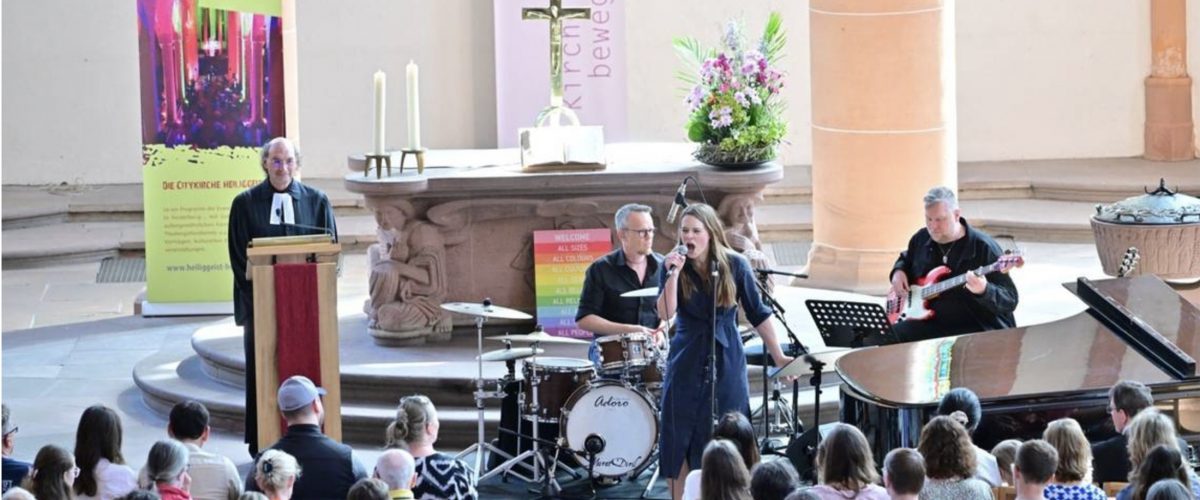Grossing more than a billion dollars in ticket sales and crossing five continents, Taylor Swift’s Eras Tour is a juggernaut of a production. Although the university town of Heidelberg, Germany, didn’t make the list of tour stops, fans could still hear her music at the Church of the Holy Spirit.
Once a month, the 600-year-old church hosts “Citykirche Rock’n’Pop,” a thematic worship service designed to “bring the contemporary world into conversation with the Christian faith.” On May 12, more than 1,000 people gathered in the Gothic church for a worship service featuring the music of Taylor Swift.

Vincenzo Petracca
“I still think the church has good answers to the important questions,” said City Church pastor Vincenzo Petracca. “But they are often packaged in a way that the younger generations do not understand.”
Since 2015, Petracca has created worship services based on the music of Madonna, the Beatles, Michael Jackson and Bob Dylan but was looking for a way to reach younger Germans who did not attend church. The Protestant church in Germany lost 575,000 members in 2022, and Sunday attendance nationwide hovers around 3%.
“The fact that Taylor Swift is currently the most powerful pop musician in the world was the deciding factor for us to choose her for the 10th pop service,” Petracca said. The timing for the service couldn’t have been better. Swift kicked off her European tour in Paris just days earlier.
“This service is not about canonizing Taylor Swift.”
Reservations for the Sunday morning “Anti-Hero: Taylor Swift Church Service” were fully booked within a few hours. Stunned organizers added a second afternoon service at 1 p.m. and an additional 600 seats to the 423 already in the nave. Petracca, amazed by the response, was quick to clarify the intent of the worship service: “We are celebrating a church service and not a pop concert. In it we look at how Taylor Swift views religion and what theological and spiritual questions she gives us as a church. This service is not about canonizing Taylor Swift.”
The packed worship services featured pink programs, live performances of Swift’s songs by local musicians and singalongs for “Swifties” who knew the lyrics. Petracca, building on themes he finds in Swift’s music, delivered short meditations on resilience, forgiveness and hope.
“Some songs are brimming with metaphors. Her music really touched me,” he said.
It touched others at the service who listened with tears in their eyes to the song Swift wrote after her mother’s cancer diagnosis. Petracca ended the service with the song “Shake It Off” and invited attendees to dance, saying, “An angel calls out to you to shake off the negative energy!”
Leading the music and standing in for Swift was Tine Wiechmann, professor of popular church music at the Protestant School for Church Music in Heidelberg. She was accompanied by local musicians Christoph Georgii (piano), Jens Nobiling (drums) and Christoph Carl (bass).
Weichman believes any musical genre has the potential to be used in a worship setting: “No genre of music is better or worse suited to this. The important thing is that you can experience a moment of faith in it.”
And for Weichman, that moment came when performing Swift’s song “Change.”
“The feeling of resilience and empowerment ‘Change’ gave me reminded me of some Bible passages that talk about challenge and solidarity,” she said.
While she is skeptical the pop music service will reverse the decline in church attendance among young people, Weichman thinks it might influence perceptions they hold about the Christian faith: “I have the great hope that people who usually can’t relate to church realize that there is something beyond the music that touches them, comforts them, gives them strength.”
On the stage behind the performers hung a rainbow banner welcoming “all sizes, all (colors), all cultures, all sexes, all beliefs, all religions, all ages, all types, all people” to Church of the Holy Spirit.
Petracca considers Swift “an icon for the queer community.” He sees a Christian message in her songs, especially those released in the last decade, when it comes to issues of social justice. “She advocates for the rights of women and queer people and denounces discrimination and racism.”

Taylor Swift performs onstage during “Taylor Swift | The Eras Tour” at MetLife Stadium on May 27, 2023 in East Rutherford, New Jersey. (Photo by Kevin Mazur/TAS23/Getty Images for TAS Rights Management)
Taylor Swift seldom speaks about her personal faith. However, in the 2020 documentary Miss Americana, she says her Christian beliefs compelled her to speak out against Tennessee Sen. Marsha Blackburn’s anti-LGBTQ agenda.
Said Swift: “I live in Tennessee. I am Christian. That’s not what we stand for.”
Her newest album, The Tortured Poets Department, is full of criticism for Christian hypocrites like Blackburn, which is why so many conservatives have taken offense and been quick to condemn it. They accuse the singer-songwriter of blasphemy, conducting satanic rituals on stage and “living in the world” rather than “living for Christ.”
But Christof Ellsiepen, dean of the Evangelical Churches in Heidelberg, who serves with Petracca, argues churches should engage the world rather than retreat from it.
Church is “a place of encounter and exchange,” he said. “That’s why a pop-music religious service fits so perfectly.”
Ellsiepen envisions a church at the center of society: “Our goal is to open and remove boundaries from the physical and spiritual space of the church. We want to make encounters possible for people from Heidelberg and all over the world in spirituality, music, art and culture.”
This month, the church will host a “street dance service” and week-long urban dance battle with participants from across Europe. Petracca is planning additional pop music services for later in the year. Given the popularity of the Taylor Swift worship service, he says, “Billie Eilish and Beyoncé are on the shortlist.”
Related articles:
Before evangelical males went after Taylor Swift, they hated on Amy Grant | Analysis by Rick Pidcock
Why are conservatives so afraid of Taylor Swift? | Analysis by Rick Pidcock
What I learned from Taylor Swift | Opinion by Bill Wilson


